
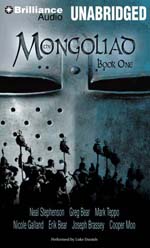 The Mongoliad: Book One (Foreworld Saga #1)
The Mongoliad: Book One (Foreworld Saga #1)
By Greg Bear, Neal Stephenson, Erik Bear, Mark Teppo, Joseph Brassey, Cooper Moo, Nicole Galland; Narrated by Luke Daniels
Publisher: Brilliance Audio
Length: 13.25 hours [UNABRIDGED]
Note: I received this audiobook as a complete package with a prequel, Sinner, included. This review only covers The Mongoliad: Book One, as I reviewed Sinner: A Prequel to the Mongoliad separately.
Themes: / mongoliad / martial arts / fantasy /
Publisher summary:
Fusing historical events with a gripping fictional narrative, this first book in the Mongoliad trilogy reveals a secret history of Europe in the thirteenth century. As the Mongols swept across Asia and were poised to invade Europe in 1241, a small band of warriors, inheritors of an ancient secret tradition, conceived a desperate plan to stop the attack. They must kill the Khan of Khans; if they fail, all of Christendom will be destroyed. In the late nineteenth century a mysterious group of English martial arts aficionados provided Sir Richard F. Burton, well-known expert on exotic languages and historical swordsmanship, a collection of long-lost manuscripts to translate — the lost chronicles of this desperate fight to save Europe. Burton’s translations were lost, until a team of amateur archaeologists discovered them in the ruins of a mansion in Trieste. From the translations and from the original source material, the epic tale of The Mongoliad was recreated.
The Mongoliad: Book One is a different sort of book. It pretty much violated all of my typical “rules” for a book, and I still find myself wanting to read on, to find out what happens in The Mongoliad: Book Two. I’m not sure the book is really a 3-star book, but I think it’s unfair to rate a book 2 stars but say that I want to know what happens next.
For those who don’t know, “The Mongoliad” was a bit of a “multimedia experiment” started by Neal Stephenson and some of his science fiction, fantasy, and historical fiction friends. The end product, the volumes in the main story as well as the side stories, was a collaborative effort by Neal Stephenson, Greg Bear, Mark Teppo, and others. Originally published on the web (though the site seems to be more or less inactive now, with the authors stating that the published works are the preferred versions), it was originally intended to be a joining of authors and various media types for different forms of story-telling. Though it seems to often be sold/pitched as a fantasy novel, the story is much more historical fiction with some fantastical elements than pure fantasy. While that may frustrate some, it was just fine for me; I loved The Baroque Cycle, after all. The story weaves fictional tales using actual events from the Mongol invasion of Europe.
The Mongoliad: Book One is comprised with a few parallel story lines. Set in the Middle Ages, the two primary story lines are that of a group of knights on a quest (including Raphael, who we met in Sinner: A Prequel to the Mongoliad) and that of an adviser/guard to a Mongol Kahn. Through these “main” story lines, there are some side-stories in the novel, including some flashbacks as well as a plotline surrounding some of the brother-knights who are not on the quest but are left to keep the Mongol invaders “occupied” (including Andreas, who we also met in Sinner: A Prequel to the Mongoliad. The fact that I’m describing this so poorly is a testament to the first major issue I had with the book, an issue that is probably only an issue with the audio version: there are a lot of names, and a lot of names that sound the same…so it can be extremely confusing to keep them all straight when listening. The second major issue I have with the book is related, that because the stories go back and forth, it can be easy to get confused as to who is who when switching between stories, especially if it’s been a day (or more) since last listening. Luke Daniels, the narrator, did a good job with using different voices for each of the characters. But if you couldn’t remember which one was the adviser and which was the slave, then the voices didn’t help much. One other note on the narration: Luke Daniels is a good narrator, one who adds to the story without adding so much that it’s distracting. That said, in addition to the confusing names, there are also flashbacks and stuff in the story, and it was hard to figure out when the story was a flashback and when it was just moving on. I suspect a print edition may have been more obvious.
While I’m on the topic of “confusing characters,” another major issue I had with the book was that it felt like it was in desperate need of an editor. This may be a factor of “too many cooks in the kitchen” or maybe it was just the contribution from each author wanting to ensure the setup for the other authors was clear…or maybe it just needed more editing. It’s not the first of Neal Stephenson’s books I’ve said this about (*cough* Anathem *cough* Reamde *cough*). Interesting plot-relevant sections would be bogged down with–or worse, broken up by–seemingly interminable character- and world-building sections. I don’t mind world- and character-building, but I felt like it could have been done much more organically than it was done in this book. Here, it was either story or it was non-story world/character setup. It would have been much more fulfilling to learn about a feature in a town by seeing a character interact with it instead of a half chapter describing the looks of the buildings. Also, this was a book heavy on battle descriptions…descriptions that didn’t really matter to the overall plot/story arc except to say “the good guys won” or “the bad guys were defeated, but not without good guy casualties.”
This leads me to the final major issue I had with the book: it didn’t end so much as stop. Not only does it end in the middle of a fairly interesting scene, but none of the story lines are wrapped up; they are all left hanging. I hope that before I go onto The Mongoliad: Book Two, I can find a good synopsis online or a cheat-sheet to remind me of who was who and what happened, since I’m going to be listening to a (very different) book before I move onto the next book…and that’s the funny thing. I’m definitely going to listen to the next book (and probably the third book). I like the characters. I want to see if the knights will be able to complete their quest (if true history is any guide, I suspect they will), and how some of the side-quests turn out. I care about the adviser to the Kahn; he doesn’t seem like a bad guy, even if the guy he’s serving isn’t a great leader. I would like to see how some of the mystical/spiritual elements play out in the actual story. So, despite my significant frustrations, possibly because I do really like historical fiction, I’m going to continue with the series. I’m not sure this book is for everyone. I’m not sure that audiobook is the best way to consume the books. But despite its flaws, I actually want to know what happens next, so onward I go…
Posted by terpkristin.

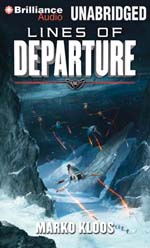 Lines of Departure
Lines of Departure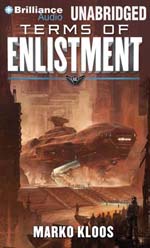 Terms of Enlistment
Terms of Enlistment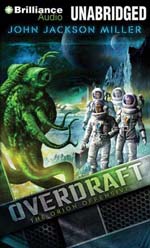 Overdraft: the Orion Exclusive
Overdraft: the Orion Exclusive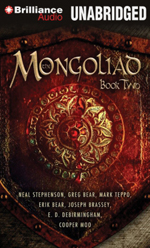 The Mongoliad Book Two
The Mongoliad Book Two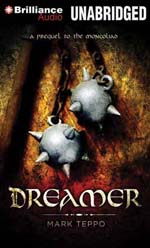 Dreamer: A Prequel to the Mongoliad (Foreworld Saga)
Dreamer: A Prequel to the Mongoliad (Foreworld Saga) The Mongoliad: Book One (Foreworld Saga #1)
The Mongoliad: Book One (Foreworld Saga #1)